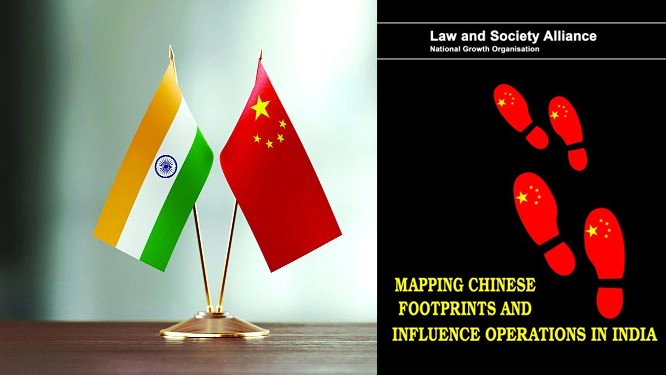A study paper titled “Mapping Chinese Footprints and Influence Operations in India” was published online by the New Delhi-based think tank Law and Society Alliance. Following the publication of the research, several China-related professionals participated in an online discussion. The experts examined how China has purchased support for itself among academic institutions, think tanks, media outlets, trade associations, tech firms, the entertainment industry, and political parties in India to sway public opinion and undermine the country from within.
China has invested enormous sums of money in buying influence in India’s film industry, universities, social institutions, research think tanks, social media, and the tech sector. The conclusion of a 76-page study report titled “Mapping Chinese Footprints and Influence Operations in India” is as follows.
Mapping Chinese Footprints and Influence Operations in India – A Summary
Chinese influence poses a severe threat to India’s security and democracy, according to a report published by the Law and Society Alliance. It covers a wide range of themes and has outlined major points and strategies used by the Chinese intelligence agencies and the Chinese government to gain a strong foothold in various Indian industries, including the entertainment industry and academics.
The research also identifies the sectors and geographies where China has boosted its influence over time through smart investments. Additionally, it exposes Beijing’s covert plans to sway Indian voters.
The Chinese government has been utilizing every trick in its playbook to make inroads into the Indian economy and society, whether through financial investments in the entertainment business or the socio-political sphere through Confucius Institutes. To forward its self-serving narrative and sow conflict in Indian society regarding China’s activities and goals, this is being done, the research claims.
Over the past few years, China has made numerous attempts to sway Bollywood and gain traction in the Indian entertainment sector. Using cinematic co-productions, this was accomplished. Additionally, it has ensured that Bollywood adequately represents its interests, or at the very least, that they are not being hurt.
Furthermore, it has tried to regulate civil society and think tanks.
The report claims that Beijing has made an effort—and in some ways, succeeded—to penetrate deeply into India’s intellectual community. It has achieved this by making kind contributions both directly and indirectly. And has been regularly facilitating exchange programs between universities and think groups. Through this program, students visit that nation at the expense of the Chinese government and unwittingly buy into Beijing’s propaganda.
The fact that a well-known public management university in India’s north-east offers a Post Graduate Programme for Executives (Managing Business in India and China), as part of which students are sent to Chinese universities, is one illustration of Chinese infiltration into the country’s educational institutions.
The neighboring nation uses the Confucius Institute, a state-supported social foundation, as another weapon to increase its influence in Indian educational institutions. The centerpiece of its propaganda strategies has been the use of the Indian media and well-known media figures to influence civil society. Using social media and mobile applications, especially those with video capabilities, Beijing has been gently attempting to sway India’s populace, as shown in several further instances in the Law and Society Alliance report.
Indian youngsters that are tech aware frequently use mobile apps for daily requirements. In addition, Chinese influence operations have attempted to control this industry, mainly through news apps. Chinese companies have made significant investments in India’s top three news applications, Dailyhunt, NewsDog, and UC News, totaling several million US dollars.
China has had an impact on the tech industry in India as well. Around USD 7 billion has been spent in the Indian tech sector by the government and businesses of that nation since 2015. Chinese firms own a sizable stake in several of the biggest tech firms in India, in addition to making numerous acquisitions.
The strong reputation that Chinese telecommunications firm Huawei enjoys among Indian corporate elites and policy circles is another troubling phenomenon that has been appropriately addressed in the report. The Communist Party of India-(CPI-M) Marxist’s decision not to condemn or criticize China is one of the cases in the Law and Society Alliance report.
Conclusion
The Law and Society Alliance research has demonstrated that China has significantly impacted several Indian sectors in recent years. Global superpowers, including the US, Canada, and Australia, have already taken action to lessen Beijing’s influence on their communities after realizing this rising tendency.

